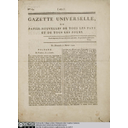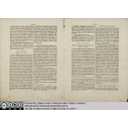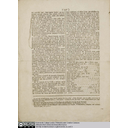2 Gazette Universelle
Gazette Universelle,
ou Papier-Nouvelle de tous les pays et de tous les jours (Gazette Universelle,
or newspaper for all countries and for every day)
Sunday 7th February
1790
Published Hôtel de
Mouy, rue Dauphine, Paris
Over the summer of 1789 thousands of printed journals and
news sheets poured from the French presses as journalists and pamphleteers
sought to take advantage of the public’s demand for news from
The emergence of a free press in
The Gazette Universelle, a daily paper first
published in December 1789, claimed to have no agenda – ‘we are, and we only
want to be historians’, wrote its editor in the Gazette’s prospectus. [1] Yet this is not entirely born out by its tone of
reporting or by its choice of subjects and Jeremy Popkin has characterised the
Gazette as moderate in its orientation and appeal. [2]
This edition, dated 7th February 1790, contains three
separate articles and a brief account of the morning’s debate in the National
Assembly. The Gazette, which was especially notable for its extensive coverage
of international events (an emphasis stressed by the paper’s subtitle), opens
with a report detailing Poland’s hopes following its alliance with the mighty
Prussia – namely that it will be in a better state to defend itself against its
aggressors. The other two articles concern home-news. The first details the
rapturous public response to Louis XVI’s statement in support of the
Constitution, pronounced in the National Assembly that morning. The second
concerns the trial of the Marquis de Favras, who stood accused of plotting to
abduct the king with the intention of smuggling him over the border to safety.
The short article details the cross-examination of two witnesses, Monsieur l’abbé
d’Eymar, and Marquis de Mirabeau. [3]
The price of an annual subscription to the Gazette
Universelle is listed at the bottom of the pamphlet as 36 livres, which
represented a considerable sum in 1790. This put a subscription to the Gazette
beyond the reach of all those with modest incomes. Yet its readership was not
necessarily so restricted for it could also be found in cafés and patriotic
clubs that held a subscription. Additionally, the habit of reading aloud from
journals meant that every copy bought could serve dozens of individuals, not
all of whom needed to be literate.
[1] Jeremy D. Popkin, Revolutionary
News: The Press in
[3] Interestingly, it was the number
of such counter-revolutionary plots to ‘save’ the king that provided him with
the impetus to pronounce his loyalty to the Constitution, for fear of being
branded counter-revolutionary himself. Favras was found guilty of treason and
hung on 19th February, twelve days after this edition of the Gazette
Universelle was printed, see William Doyle, The Oxford History of the French
Revolution,
Licensed under the Creative Commons Attribution Non-commercial Share Alike 3.0 License
This resource has been released as an open educational resource (OER) on a Creative Commons 'Attribution Non-commercial Share Alike' license. This means that once downloaded, content can be modified and improved to complement a particular course. This requires, however, that improvements are recycled back into the OER community. All content present at the time of download must be accordingly credited and, in turn, novel content must be appropriately licensed.


